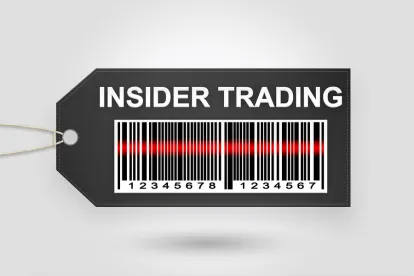Senator Burr’s Trades and the STOCK Act
On February 13, 2020, one day after he received a classified briefing on the likely impending effects of the COVID-19 pandemic in the United States, Senator Richard Burr sold between $628,000 and $1.7 million worth of stock. The pandemic spread to the United States soon afterwards, and Senator Burr avoided significant losses when the value of those stocks plunged. In the wake of that news, there was a great deal of public outrage, and many calls for Senator Burr to be punished. Some observers specifically called for that punishment to include criminal prosecution under the STOCK Act (The Stop Trading on Congressional Knowledge Act) (Public Law 112-105), which was intended to prevent members of Congress from engaging in insider trading. And sure enough, according to news reports the SEC and the Justice Department have opened investigations of Senator Burr’s conduct.
But the STOCK Act does not actually create criminal (or civil) liability for insider trading by members of Congress; rather, it clarifies that members of Congress owe a fiduciary duty to Congress for the purpose of previously existing insider trading prohibitions; and that members of Congress are subject to the same insider trading rules as anyone else who owes that kind of duty and is therefore barred as an “insider” from trading on material non-public information (“MNPI”). (P.L 112-105 § 4).
In a public statement, Senator Burr effectively conceded that he directed the trades in his account himself but claimed he had done so based on publicly available news reports. In light of this statement, much of the commentary on the potential difficulty of prosecuting Senator Burr has focused on the possible difficulty of proving that his trades were based on MNPI, rather than publicly available information as he claims. But proving that Senator Burr traded based on MNPI likely will not be difficult.
Trading “On the Basis” of MNPI (Material Nonpublic Information)
It is well known that in a glaring exception to the American legal principle forbidding common-law crimes, no federal statute explicitly proscribes insider trading. Instead, insider trading has traditionally been outlawed through a series of SEC rules and judicial opinions interpreting broader federal securities fraud laws and regulations, especially Section 10b of the Exchange Act of 1934 and the SEC’s Rule 10b-5 implementing it.
In 2000, the SEC enacted Rule 10b5-1, which defines what it means for an insider to trade “on the basis of” material non-public information, a necessary element of an insider trading action: absent the existence of other specific affirmative defenses, “a purchase or sale of a security…is ‘on the basis of’ [MNPI] about that security…if the person making the purchase or sale was aware of the [MNPI] when the person made the purchase or sale.” 17 C.F.R. § 240.10b.5-1(b) (emphasis added). The Second Circuit Court of Appeals, the federal appeals court covering the trial courts in New York, where most insider trading cases are brought, has endorsed this standard of “knowing possession” of MNPI. See United States v. Rajaratnam, 719 F.3d 139, 158-59 and n.24 (2d Cir. 2013)
Therefore, Senator Burr’s apparent defense that when he traded because of what he learned from publicly available news reports, rather than the classified briefing that he indisputably received, is irrelevant – all the government needs to prove is that Senator Burr traded while he was “aware of” the information he received at the briefing, assuming the briefing constitutes MNPI. The government does not need to prove there was a causal connection between Senator Burr’s learning that information and his decision to trade.
MNPI “About That Security or Issuer”
However, a prosecution under Rule 10b-5 might have to overcome, likely must overcome at least one other hurdle. Rule 10b5-1 prohibits conduct to “include…the purchase or sale of a security of any issuer, on the basis of [MNPI] about that security or issuer, in breach of a duty or trust or confidence that is owed…to any person who is the source of the material non-public information” (emphasis added). 17 C.F.R. § 240.10.b5-1(a). The phrase “about that security or issuer” leads to interesting questions about whether Senator Burr can be prosecuted or sued for violating this traditional insider trading law, even if he traded while aware of MNPI he learned in his capacity as a member of Congress.
For example, one of the stocks Senator Burr sold after he received the classified briefing was Wyndham Hotels. Clearly, if the briefing Senator Burr received including an analysis of the exposure of all major American hotel chains to a COVID-19 pandemic, and specifically described the expected effects on Wyndham’s operating results, then he engaged in insider trading in violation of Rule 10b-5.
But assume for the sake of argument that the briefing Senator Burr received (1) did not include any information specific to Wyndham Hotels, and also assume that Wyndham only had operations in the United States); and (2) informed him that there was a high likelihood COVID-19 would become as widespread in the United States as it already was in China. Any prudent investor would understand that the American travel and tourism industry writ large, of which Wyndham is a part, would suffer economically if similar public health measures were instituted in the United States as had previously been imposed in China – does that make the classified briefing information “about” Wyndham for the purpose of this rule?
What if the classified briefing didn’t focus on the public health aspects of the pandemic, but on the economic effects generally – for example, if the briefing informed the Senators that the American economy was likely to contract in 2020 due to COVID-19 – again, any prudent investor would understand that such an economic contraction would likely affect the American travel and tourism industry in general, and therefore Wyndham. Would that classified briefing information be “about” Wyndham as defined by the rule?
Or what if the briefing included information more specific to the hotel sector but not Wyndham, such as an analysis predicting that the hotel room occupancy rate in the United States in 2020 would fall 50% from 2019 levels? Would that constitute information “about” Wyndham for these purposes?
There is no clear answer in statute, regulation, or case law to these questions, and it is easy enough to craft plausible arguments on either side of this question of regulatory interpretation. But the root of the problem is that the type of “insider” traditionally charged with insider trading is a someone tied to the issuer of a particular security, such as a director or officer of a specific company, or someone who misappropriated MNPI from a specific company, such as a company’s lawyer. When such people misused MNPI, it was almost invariably MNPI tied to that company, or a company engaging in a transaction with it – an insider with advance access to an earnings report, or confidential knowledge of an upcoming merger. That is why Rule 10b5.1(a) is written the way it is. But while Congress may at times have access to such company-specific information, by its very nature Congress often has access to sector-wide or economy-wide information.
Ramifications of Legal Uncertainty
Before proceeding with a case, a prosecutor or regulator would need to learn the specific contents of the classified briefing, compare it with the stocks Senator Burr traded, and then consider the issues closely. And as one academic commentator has noted, at least with respect to “economy-wide” material non-public information, if members of Congress and their staff cannot trade while in possession of such information, such an interpretation effectively bars covered individuals from trading in stock at all.[1] And because Congress did not enact such a trading ban (as others had proposed, and some are once again proposing in the wake of Senator Burr’s sales), courts should not interpret the rule in a way that has the same result as what Congress specifically declined to legislate.[2]
But Senator Burr should not take too much comfort from this potential legal defense. For he should also note the word “including” that prefaces the quoted passage of Rule 10b5.1(b) – so if a prosecutor or regulator has another theory establishing insider trading liability without relying on Rules 10b-5 and 10b5-1, such a theory would not necessarily be bound by the language and interpretations of those rules.
As it happens, the Second Circuit’s recent decision in United States v. Blazczak, 2019 WL 7289753 (2d Cir. Dec. 30, 2019) affirmed federal prosecutors’ novel use of the mail fraud statute and a different securities fraud statute (18 U.S.C. §§ 1341 and 1348) to prosecute insider trading. And in affirming the prosecutors’ use of these statutes to charge insider trading, the Second Circuit also held that when prosecuting cases using these statutes the government did not need to prove some of the elements that it has to prove when in prosecutes insider trading using the “traditional” bases of the Exchange Act of 1934 and the Rule 10b5 implementing it. The prosecutors currently investigating Senator Burr’s trades must be well aware that the Second Circuit has given them another tool that would likely enable them to charge Senator Burr without having to prove that the MNPI he learned in the briefing was “about” Wyndham, or any of the other stocks he traded.
Conclusion
These questions highlight the distinct, atypical circumstances of an insider trading case involving a member of Congress who violates their duty to the American people by trading on material nonpublic information they learned through their position a member of Congress, as opposed to a corporate insider who violates their duty to the corporation and its shareholders by trading on material nonpublic information they learned by virtue of their position as a corporate insider. As with the state of insider trading law more generally, further clarity from Congress and the SEC on this question would be helpful.
[1] See Jeanne Schroeder, “Taking STOCK: Insider and Outsider Trading by Congress.” 60 William & Mary Business Law Review 159, 236-37 (2014)
[2] In another of its provisions, the STOCK Act directed the Ethics Committees of both houses of Congress to issue guidance clarifying that members and their staff may not profit from information they learn through their public positions. (P.L 112-105 § 4(a)). This alternative sanction imposed on members of Congress and staff who profit from trading on economy-wide or sector-wide material non-public information offers another reason to conclude that in the STOCK Act Congress did not intend to sanction such conduct as a violation of already existing insider trading laws.




 />i
/>i

